Genre: Strategy/RPG Developer: KOEI Publisher: KOEI Players: 1 Released: 1992
When I first encountered Uncharted Waters, it threw me for a bit of a loop. From its presentation with the top-down perspective, the sprite characters, the interface, and the way you explore the world map and interact with other characters, I expected it to be a classic JRPG. Sure enough, the game starts with quite a bit of story, so I was a bit surprised when I played for hours after that introductory bit without encountering more story, with no clear idea of what to do or how to proceed. That’s because it’s not “just” an RPG, but more a strategy/RPG mix. Although, let’s scratch that as well, because this isn’t too apt of a description either. Uncharted Waters is pretty much a strategy game throughout, with economic simulation and also some story thrown in into the mix. However, once you realize this and are willing to enter into the spirit of the game, you will realize that what we have here is a surprisingly deep and complex game that offers up hours of gameplay. You just need to get the hang of it.
Like many others of KOEI’s strategy games, this one is somewhat based in history. In the Year of the Lord 1492, Christopher Columbus and his small fleet of Spanish ships reached a “new world.” In 1498, Vasco da Gama opened a sea route to India. Soon, the European courts realized that the exploration of these continents promised fantastic opportunities. Gold, spices, strange new products, or slaves – other parts of the world soon became spots to either extensively trade with or otherwise exploit, starting with the Caribbean. This was the beginning of the Age of Exploration. The might of Spain grew intensively, and other nations looked enviously and greedily at the success of that nation. And it neighbor, Portugal, got involved in all of this, both trying to keep up and not getting too caught up in the resulting powerplay.
This is when you, or rather, the protagonists of this game, come into play. It is now the year 1502, and you take on the role of the young Leon Franco. Once one of the most influential houses of Portugal, the Leon family went into decline after your great-grandfather took part in a disastrous expedition to find the legendary kingdom of Prester John. After his father’s death, the barely 16-year-old Leon inherits what has remained of the once proud family name: a small trading post in Lisbon and a small ship with a crew of 20 and a singly mate. Portugal itself doesn’t fare very well either. Neighboring Spain and the Ottoman Empire are the ruling factions on the seas of the world. However, Leon decides to set out to restore his family’s good name and make Portugal a proud nation once more.
So, after securing and financing your first ship, the game proper begins. First, you need to increase your finances by setting up trade routes, but in the long run you are set to become a scourge of the seas and a great explorer. At the beginning, you should keep to closer cities and keep an eye out on good deals and trading goods. Once you’ve secured your finances well enough, you can extend your fleet, buy bigger and better vessels, and finally set out to explore other continents. At least in the beginning though, it is extremely important to stick to the coast lines. Don’t set out too far into the unknown too early though – aside from uncertain weather, unfriendly ships and dangerous typhoons, there may be monsters! Literally!
Each harbor you land in offers different services. In market places you trade goods and wares and find the occasional task to accomplish. The shipyard can repair or improve your ships, though prices and services may differ from port to port. You should also occasionally visit the tavern, where you can catch up on rumors or try your luck at gambling. Careful though – some of your opponents may cheat!
Aside from the occasional bits of story you come across, there are also a handful of RPG elements in there. Before you start the game, you fist spend a few points on Leon’s abilities. These improve automatically during the course of the game. In every city there’s also a guild house where you can check up on your (and your mate’s) stats. This is also the place where you find a few expensive but very important tools like a Sextant (to figure out your position at sea), speculum (to map out your position), swords (to boost your strength in battles) or amulets (to protect your ship from dangers of the sea). You can also buy treasures there which may help you win the heart of Christina, princess of Portugal. Needless to say, as friendly as she may be towards you, in order to win her over you also need to climb in rank at the Portuguese court. And there’s still your great-grandfathers lost expedition… needless to say, there are many, many things to do in the game. And while you need to take your time, you shouldn’t dilly-dally too much; after 20 in-game years, the game is over, whether you’ve accomplished all your tasks or not.
Once out of port, you steer the boat icon representing your fleet across the sea. Depending on the wind, the currents and your rudder you may proceed faster. Since your provisions and your water is limited (depending on how much you bought at a port), you need to reach a safe harbor within a certain number of days. Once you’ve established some secure trade routes within Europe and have purchased your fist Carrack or Galleon, you’re finally set to wager a journey to India or the Americas.
Seafaring is not without its dangers though, and sooner or later you have to go into battle. All involved parties are represented by individual icons. Your firing range is dependent on the type of cannons your vessels are equipped with. Sand banks, reefs and small isles pose additional challenges and require a lot of strategic forethought in your battles. Should you win, you may plunder enemy vessels and press more people into your crew. Whenever you’ve managed to increase the influence of Portugal across the seas you may visit the court in Lisbon, where you may receive specific royal tasks, rise in rank or, if you’re lucky, receive presents of the pleased monarch. If you’re particularly successful, you may eventually date or even marry Princess Christina.
So, Uncharted Waters is a surprisingly deep, challenging and very entertaining game. Unfortunately, it is not very accessible. Don’t even think about setting out into the depths of this game without manual at hand. Also, you need to take note and write down a lot of things in order to map out ideal trading routes – better keep a separate notebook ready. The graphics are decent, although the cities could be more detailed, and occasionally a few more colors would have been nice. The sound is adequate, but as with the graphics, it pretty much just gets the job done. Mind you, it is decent enough that you may even listen to it after a few hours of continuous gameplay, if not enjoy it. And believe me, you absolutely NEED to play the game for hours on end in order to proceed. This is definitely no title for the casual gamer! This requires both economic and strategic care and forethought. And don’t expect for the story elements to just fall into your lap – you have to work for your progress, baby!
If I find fault within the game it’s because I encountered (and enjoyed) the sequel first – and the latter is just better in every regard: More accessible, higher replay value (due to the presence of six different campaigns, more versatility). Uncharted Waters takes quite a long time to get going, and since it proceeds rather slowly, boredom might set in at some point. However, every time I reached a point when I felt things getting too repetitive, I received a new royal task or reached a point that enabled me for more exploration, and then the game drew me right back in. So, if you’re a fan of strategy games, if you’re a history buff interested in the Age of Exploration, and if you enjoy a little bit of story – but not too much – in your simulations, then give this game a try. Just remember to invest a lot of time into this title before you’re getting anywhere.
SCORE: 7 out of 10

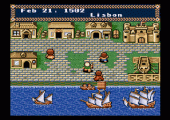
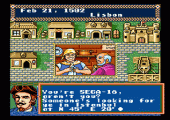
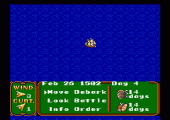
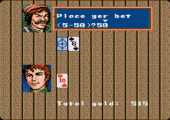
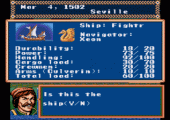
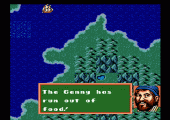
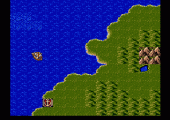
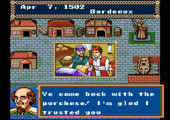
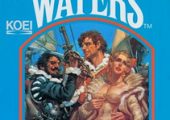
Recent Comments